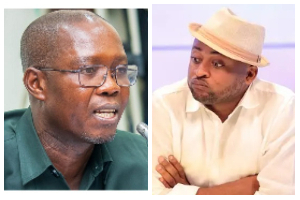We welcome and encourage entrepreneurship in Ghana but we must, if we want to avoid graft and corruption, strengthen our Conflict of Interest Laws and not allow our politicians, government agents or appointees and other public officials to use inside knowledge because of their positions to take advantage of Ghanaians. This is the reason we need to investigate the part played by EO Group. This is strictly according to law and not witch hunt.
The EO Group acted in contravention of the country's Conflict of Interest Laws. A public officer or politician is supposed to use the powers invested in him or her to negotiate in the interest and on behalf of the government and the people of Ghana. Dr. Kwame Bawuah Edusei and his cronies acted against the basic tenets of this rule.
Instead of negotiating on behalf of the government and people of Ghana as public officials, they decided to form a company of their own and using their contacts in government, some of whom would indirectly benefit from the acts of EO Group, and negotiated lucrative deals for themselves.
The whole of Ghana has a snare whereas two individuals, Dr. Kwame Bawuah Edusei, Ghana's Ambassador to the United States, and one George Owusu with heavy contacts in the NPP government) have between them 3.5%. They used their offices - information available to government officials - and connections in government to usurp the interest of the country Ghana. Read just a part of the Conflict of Interest Laws for yourself.
State officer or employee or member of legislature; acceptance of thing of value to influence public duties.
No State officer or employee, special State officer or employee, or member of the Legislature shall accept from any person, whether directly or indirectly and whether by himself or through his spouse or any member of his family or through any partner or associate, any gift, favor, service, employment or offer of employment or any other thing of value which he knows or has reason to believe is offered to him with intent to influence him in the performance of his public duties and responsibilities.
This section shall not apply to the acceptance of contributions to the campaign of an announced candidate for elective public office.
(a) In our representative form of government, it is essential that the conduct of public officials and employees shall hold the respect and confidence of the people.
Public officials must, therefore, avoid conduct which is in violation of their public trust or which creates a justifiable impression among the public that such trust is being violated.
(b) To ensure propriety and preserve public confidence, persons serving in Government should have the benefit of specific standards to guide their conduct and of some disciplinary mechanism to ensure the uniform maintenance of those standards amongst them.
Some standards of this type may be enacted as general statutory prohibitions or requirements; others, because of complexity and variety of circumstances, are best left to the governance of codes of ethics formulated to meet the specific needs and conditions of the several agencies of government.
(c) It is also recognized that under a free government it is both necessary and desirable that all citizens, public officials included, should have certain specific interests in the decisions of government, and that the activities and conduct of public officials should not, therefore, be unduly circumscribed.
Representation, appearance or negotiation, directly or indirectly, for acquisition or sale of property by state No member of the Legislature or State officer or employee shall represent, appear for, or negotiate on behalf of, or agree to represent, appear for, or negotiate on behalf of, whether by himself or by or through any partnership, firm or corporation in which he has an interest or by any partner, officer or employee of any such partnership, firm or corporation any person or party other than the state or state agency of any interest in real or tangible or intangible personal property, or any proceedings relative to such acquisition or sale before condemnation commission or court ;provided ,however nothing contained in this section shall be deemed to prohibit any person from representing himself in negotiations or proceedings concerning his own interest in real property.
Certain representations, prohibited; exceptions
5. a. No special State officer or employee, nor any partnership, firm or corporation in which he has an interest, nor any partner, officer or employee of any such partnership, firm or corporation, shall represent, appear for, or negotiate on behalf of, or agree to represent, appear for or negotiate on behalf of, any person or party other than the State in connection with any cause, proceeding, application or other matter pending before the particular office, bureau,board,council, commission, authority, agency, fund or system in which such special State officer or employee holds office or employment.
b. No State officer or employee or member of the Legislature, nor any partnership, firm or corporation in which he has an interest, nor any partner, officer or employee of any such partnership, firm or corporation, shall represent, appear for, or negotiate on behalf of, or agree to represent, appear for, or negotiate on behalf of, any person or party other than the State in connection with any cause, proceeding, application or other matter pending before any State agency.
Nothing contained herein shall be deemed to prohibit any such partnership, firm or corporation from appearing on its own behalf. This subsection shall not be deemed to prohibit a member of the Legislature or an employee on the member's behalf from:
(1) making an inquiry for information on behalf of a constituent, which may include ascertaining the status of a matter, identifying the statutes or regulations involved in a matter or inquiring how to expedite a matter;
(2) Assisting the constituent in bringing the merits of the constituent's position to the attention of a State agency; or
(3) making a recommendation on a matter or indicating support for a constituent's position to a State agency if no fee, reward, employment, offer of employment, or other thing of value is promised to, given to or accepted by the member of the Legislature or an employee therefore, whether directly or indirectly, and the member or employee does not endeavor to use his official position to improperly influence any determination.
As used in this subsection "constituent" shall mean any State resident or other person seeking legislative assistance.
Nothing contained herein shall authorize contact with State agencies by members of the Legislature or their employees which is otherwise prohibited by the criminal law, this act or the Code of Ethics and nothing contained herein shall authorize contact with an administrative law judge or agency head during the hearing of a contested case political leaders, public officials and their cronies to take advantage of official knowledge and public trust to enrich themselves.
As a matter of fact, it is a crime for politicians or public officials to have their companies to deal with the government. If one wants to stay in business that person should stay in business.
That person cannot become a politician and direct government contracts, through undue influence to his or her company or to gain undue advantage over other companies genuinely owned by individuals with no government connections. This is entrepreneurship without undue influence and that is what we must practice in Ghana.
We cannot allow situations where government officials also pass on insider investment information to their relatives and friends to gain undue advantage of ordinary Ghanaians.
By Dr. Kwasi Asamoah
Opinions of Monday, 18 January 2010
Columnist: Daily Express
EO Group and Conflict of Interest Law
Entertainment














